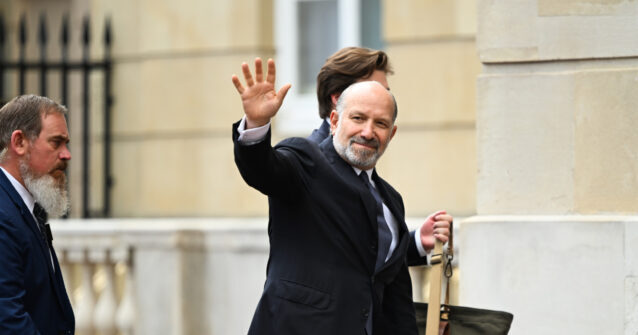LONDON—Talks between the US and China will stretch into a second night in London, according to U.S. officials.
Trade negotiations began Monday and were initially expected to conclude Tuesday morning, giving Treasury Secretary Scott Bessent time to return to Washington, D.C. in time for a hearing on Capitol Hill Wednesday.
The talks extended throughout the day, however, and are now expected to last into the night.
The Chinese delegation, led by Chinese Vice Premier He Lifeng, were seen leaving Lancaster House, the historic mansion where the meetings have been taking place, around 5:30 p.m. for what U.S. officials described as a break. The talks are expected to resume around 8 p.m., U.S. officials said.
Commerce Secretary Howard Lutnick left the site at 6:20.
“We’ve got more to do. We’re coming back at 8 o’clock,” Lutnick said to reporters gathered in a courtyard outside of Lancaster House.
It is unclear if Bessent will leave the talks in time to return to Washington for the hearing before the House Ways and Means Committee. Bessent and Greer remained at Lancaster House.
Earlier, the Chinese delegation left for just over an hour shortly after food was delivered to Lancaster House for lunch.
The meeting began around 10:40 a.m. on Tuesday. Monday’s meeting had concluded around 8 p.m.
As he arrived Tuesday morning, Lutnick said the meetings were “going well.” Treasury Secretary Scott Bessent said they had had “a good meeting” the day before. U.S. Trade Representative Jamieson Greer, the third member of the triumvirate of U.S. officials leading the talks, did not talk with reporters as he arrived.
A Treasury official said that the two sides were “ironing out technical details,” suggesting that the talks have become far more detailed than initially expected.
The central goal of American negotiators is to revive a deal struck in Geneva last month, in which Washington believed it had secured Beijing’s commitment to increase shipments of rare earth elements to American firms. U.S. officials have since criticized China for delaying implementation, warning that the holdup could disrupt domestic production lines.
China is seeking to have the Trump administration remove trade restrictions on high-tech microchips used in artificial intelligence, according to individuals briefed on the negotiations. China had also objected to plans to strip Chinese students of visas to study at American universities but Trump earlier said he would drop those plans.
Read the full article here


